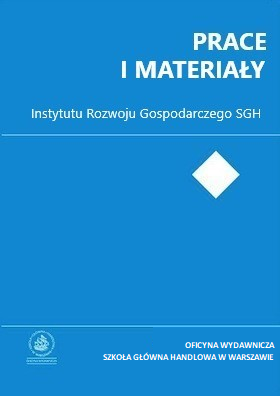Priorytety strategii trwałego i zrównoważonego rozwoju Unii Europejskiej
Main Article Content
Abstract
The idea of sustainable development originates from the criticism targeted at growth supporting economic policy posing a threat to natural development. The concept itself assumes striving for balanced combination of requirements of social development, economic growth and environmental protection while development decision - making process so that needs of living generations could be met and the needs of future generations could be satisfied. However, it is far from obvious how to pursue this generally justifiable idea. The purpose of the research paper is to have an insight into priority areas of the current European Union Sustainable Development Strategy (SDS) and to indicate some dilemmas resulting from the pursuit of the Strategy, including the ones perceived by Poland. Priorities of the SDS concern seven major challenges, such as: climate change and clean energy, sustainable transport, production and consumption in line with rules of sustainable development, environmental protection and natural resources management, public health, social integration, demography and migrations, poverty and challenges of sustainable development in global terms. Although Poland's joining the SDS pursuit benefits us, we often lose much because of our poor ability to take advantage of the Union's official principle to attain the priorities of the Strategy in line with the specificity of the set member country as well as the weakness of our internal policy of pursuing the idea of sustainable development. (original abstract)
Article Details
References
Donella H. Meadows, Dennis Meadows, Jorgen Randers, William W. Behrens III, The Limits to Growth. A Report to The Club of Rome 1972.
Ekspertyzy do Koncepcji Zagospodarowania Przestrzennego Kraju 2008-2033, MRR, Warszawa 2008, T. I.
European Union Strategy for Sustainable Development, Gothenburg European Council, COM(2001) 264 final, 2001.
Fiedor B. Zasoby nieodnawialne w teorii trwałego rozwoju, http://www.lp.gov.pl/Members/aktualnosci/konferencja_uj Goklany I.M., The improving state of the World, Cato 2007.
Jaśkiewicz J., Dylematy zrównoważonego rozwoju w Polsce, „Problemy Ekorozwoju : studia filozoficzno-socjologiczne”, 2008, Vol. 3, nr 1, s. 33-38.
Our Common Future, a report from the United Nations World Commission on Environment and Development, 1987, Oxford: Oxford University Press.
Prandecki K., Teoretyczne aspekty zrównoważonego rozwoju, Akademia Finansów 2008, materiał seminaryjny Presidency Conclusions, Lisbon European Council 23-24 March 2000.
Progress on EU Sustainable Development Strategy, Final Report, ECORYS, Brussels/Rotterdam 2008.
Review of the Sustainable Development Strategy (EU SDS)- Renewed Strategy, Council of The European Union, Brussels, 9 June 2006.
Stacewicz J. , Megatrendy a strategia i polityka rozwoju, Komitet Prognoz „Polska XXI wieku” przy Prezydium PAN, Warszawa 1996.
Stacewicz J., Prognozowanie rozwoju społeczno-gospodarczego, SGPIS, Warszawa 1986.
Strategia zmian wzorców produkcji i konsumpcji na sprzyjające realizacji zasad trwałego, zrównoważonego rozwoju. Dokument przyjęty przez RM w dn. 14 X. 2003 r.
Sustainable Europe for a Better World: A European Union Strategy for Sustainable Development, Gothenburg European Council, COM(2001) 264 final Commission Communication of 15 May 2001.
Sulmicka M., Ubóstwo we współczesnym świecie, Monografie i Opracowania SGH, 2001, nr 486.
Sulmicka M., Wskaźniki strukturalne jako instrument monitorowania polityki rozwoju Unii Europejskiej, w: Polityka gospodarcza w warunkach integracji z Unią Europejską, „Prace i Materiały IRG”, Oficyna Wydawnicza SGH, Warszawa 2009, z. 82, s.117-147.
Żylicz T., Globalne wyzwania ekologiczne. Przyszłość- świat – Europa – Polska, Komitet Badań i Prognoz „Polska 2000 plus”, 2008, nr 2.
